SUBSCRIBE 11
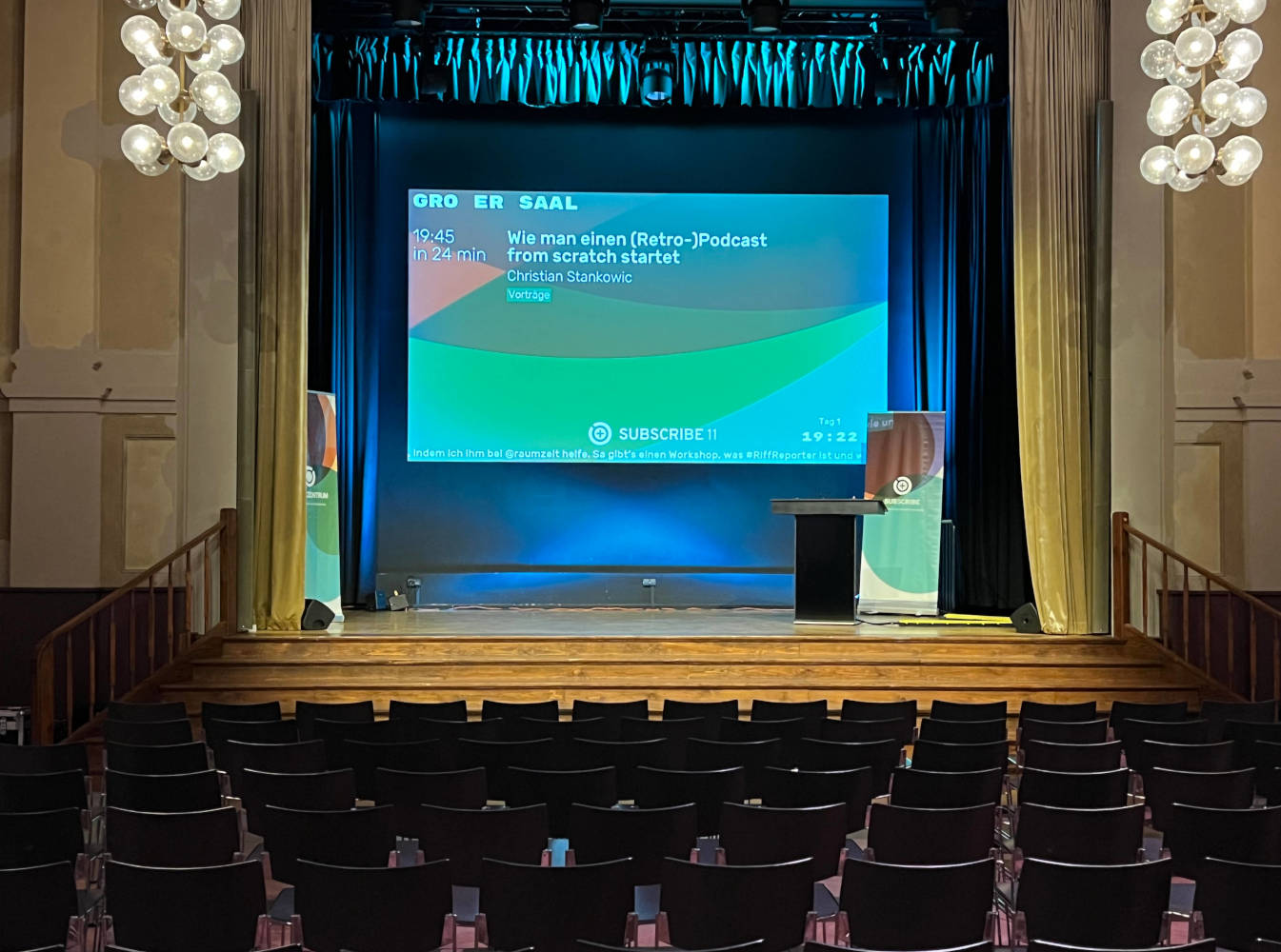
After a 5-year break, the SUBSCRIBE took place again from 18.10 to 20.10.2024. The 11th edition of the conference took place on the premises of the Bildungs- und Kulturzentrum Peter Edel in Berlin and was once again all about the independent podcasting scene. The program included numerous lectures and workshops. In contrast to other podcasting conferences, Subscribe sees itself as a community meeting and enables very personal networking - 150 participants took up the offer. It was my first podcasting conference.
Location
The location is easy to reach by public transport and is within walking distance of the Weißer See. There are different rooms for individual events and Wi-Fi was not a problem. The location was just the right size: it was neither too small for the participants, nor was it difficult to find your way around the individual sessions. An outdoor area was used for food breaks and networking.
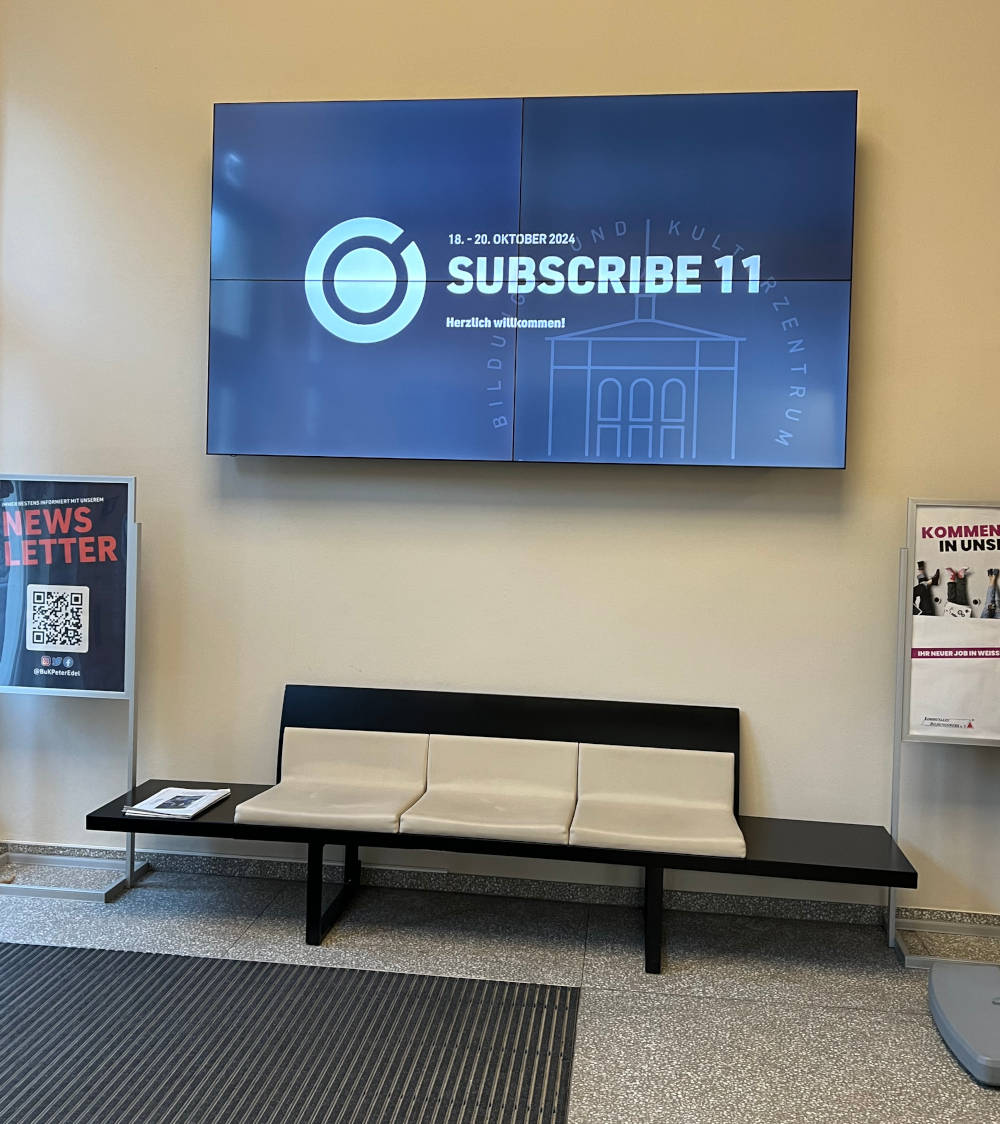
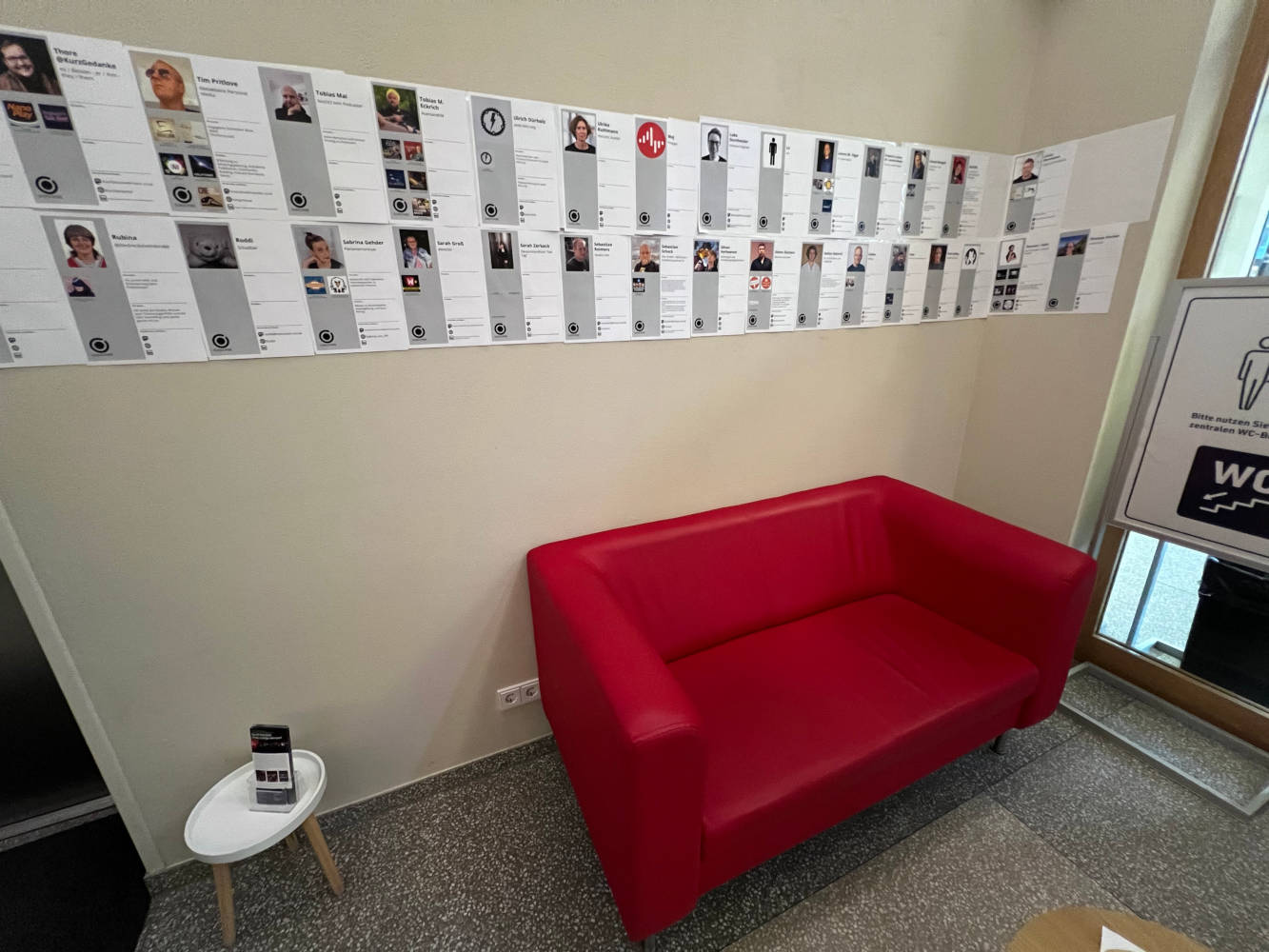
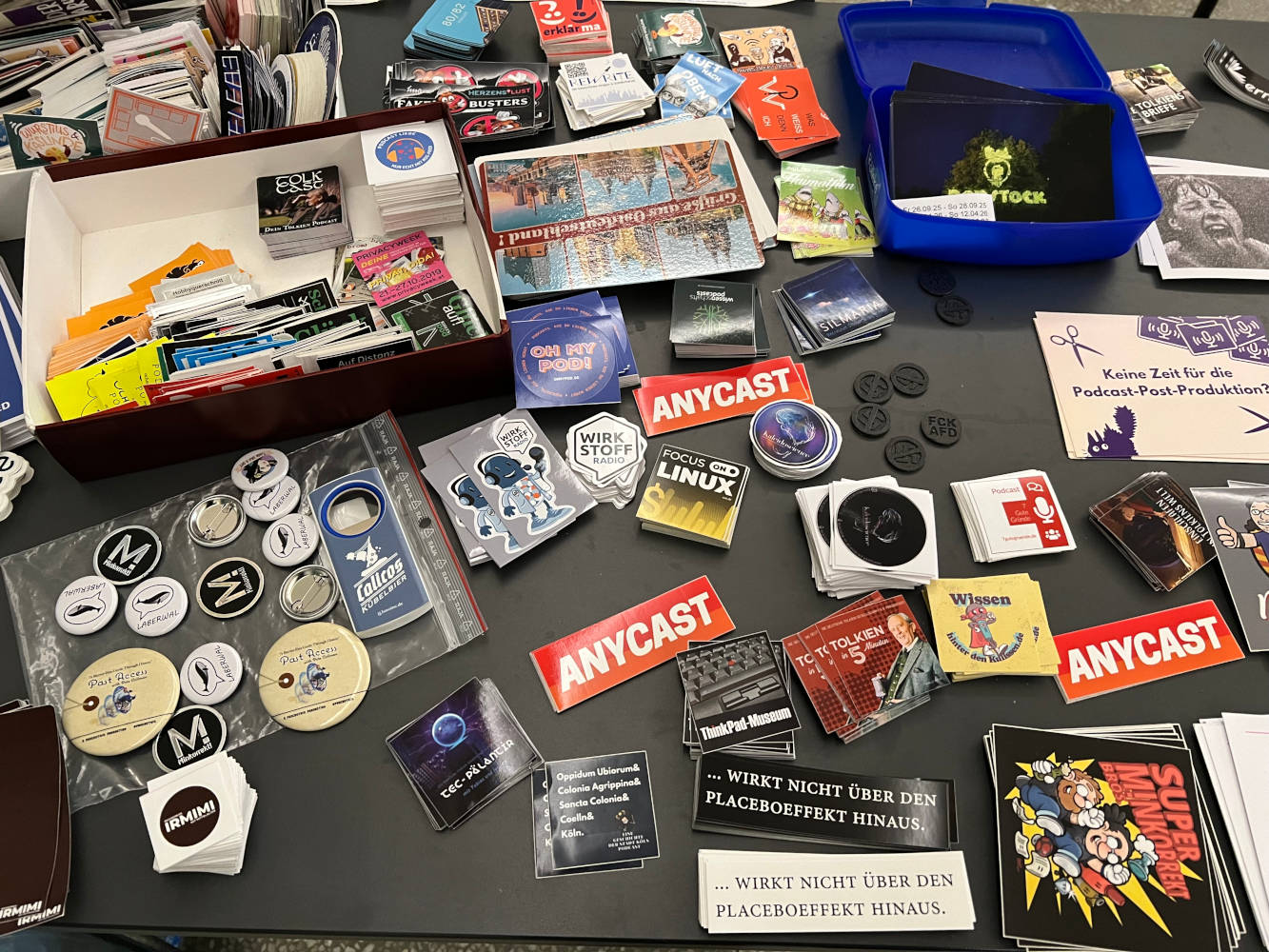
Talks and workshops
The program consisted of 52 lectures and workshops in different rooms. In two of the three rooms, the sessions were again streamed live by the Chaos Computer Club's video team (C3VOC) live streamed and can now also be watched online free of charge.
The opening was, at least for me, unusual. In addition to a few introductory words, the participants' input was called for above all. This allowed everyone to introduce themselves and address expectations and wishes for the coming days. This made it possible to identify interesting discussion partners and make new contacts right from the start.
In the presentation Ich kann so nicht arbeide - Albtraum Comedypodcast (📽️), Danny Frede gave entertaining and valuable insights into a comedy project that deals with the movie Kein Pardon minute by minute.
I myself was also able to contribute to the program with the session Wie man einen (Retro-)Podcast from scratch startet (📽️) and gave insights into the ThinkPad museum, which was launched about a year ago. This resulted in nice conversations and valuable feedback afterwards - many thanks for that!
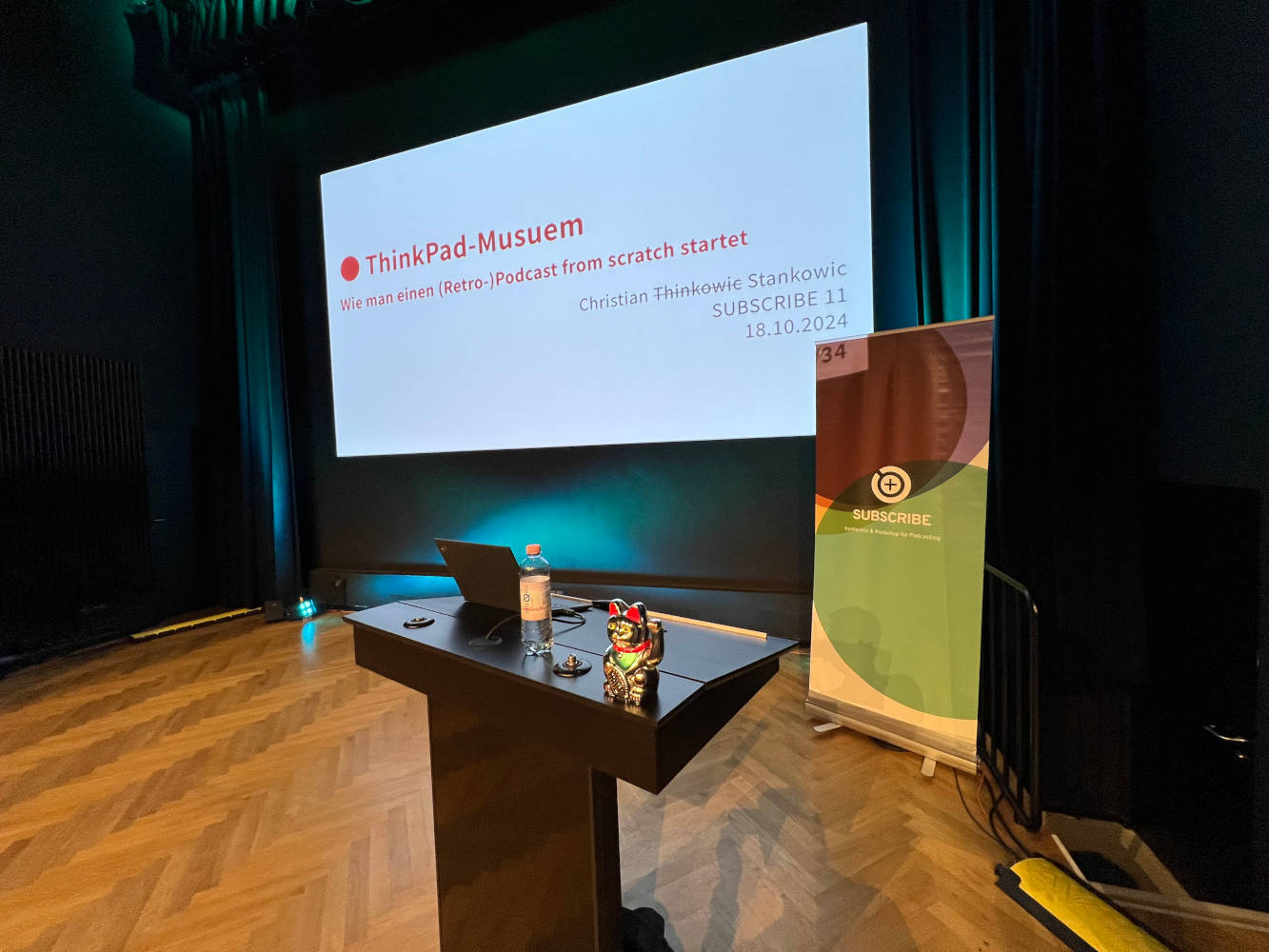
Afterwards, Tim Pritlove summarized 50 years of technological developments that have dealt with individual communication in his lecture Im Dunkeln ist alles viel aufregender (📽️). He also shed light on the path to the first podcast formats and predicted a bright future for this popular medium.
In the presentations Podlove Podcast Publisher (📽️) and Podlove Web Player (📽️), Eric Teubert gave insights into the development of the respective projects. Podlove stands for a series of WordPress plugins that have been in development for 12 years and drastically simplify the publishing of podcasts. The Podlove Publisher offers an easy-to-use interface for managing RSS feeds and maintaining transcripts and show notes. In addition to Analytics, an Auphonic integration is also offered. The project was funded by the Prototype Fund and is popular in the scene.
In addition, the Podlove Web Player is a HTML5-based player. In addition to chapter markers, this also supports transcripts and streaming and can also be operated without WordPress - for example for static websites. The player has also been under development since 2012 and is currently available in the 5th version, which is characterized by flexible theming, among other things. Earlier versions were outlined using screenshots and stories.
Last but not least, there is the Podlove Subscribe Button, which makes it easier to subscribe to your own podcast. This directly suggests various apps in which the feed can be transferred. This development can also be used without WordPress.
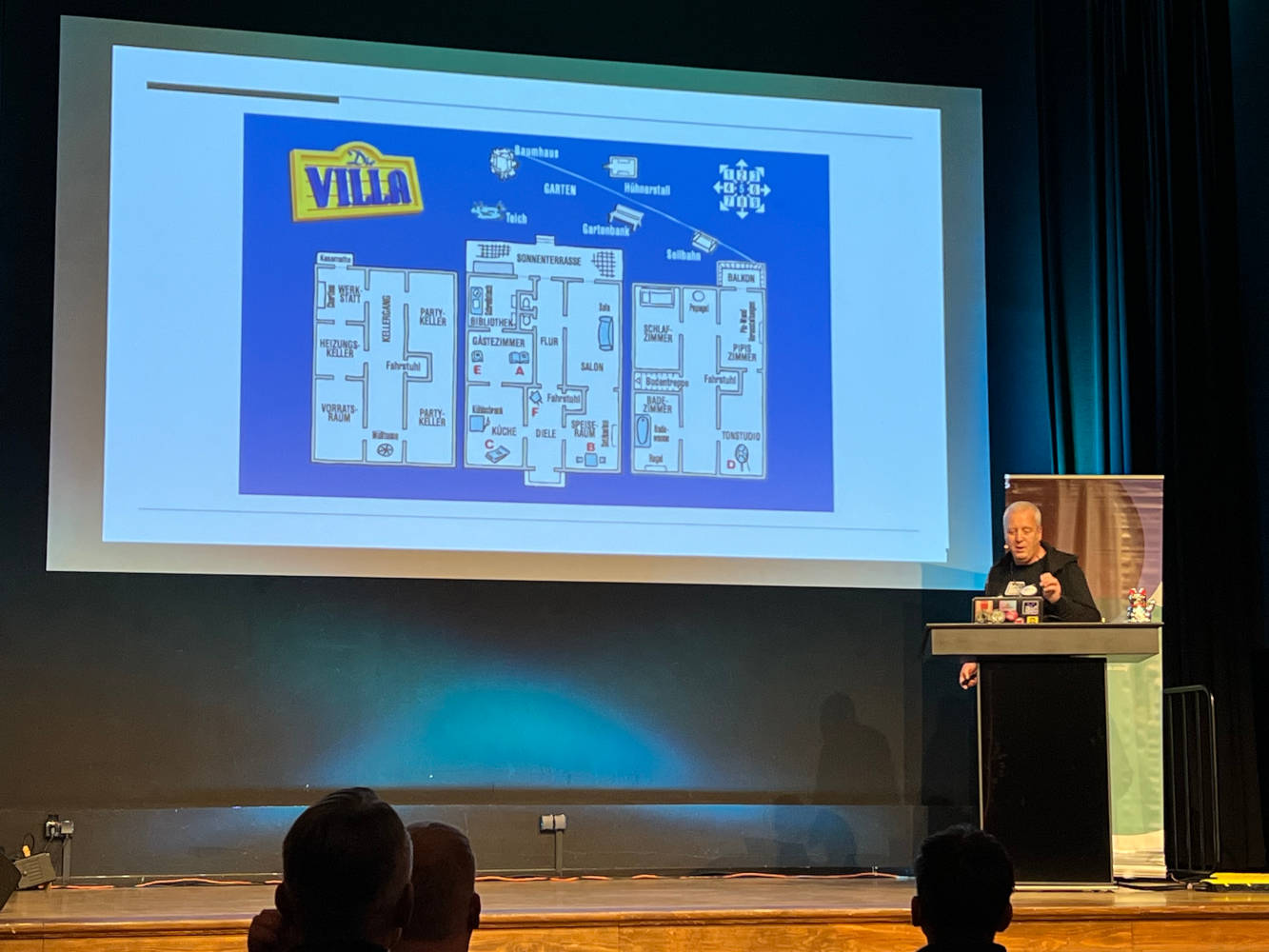
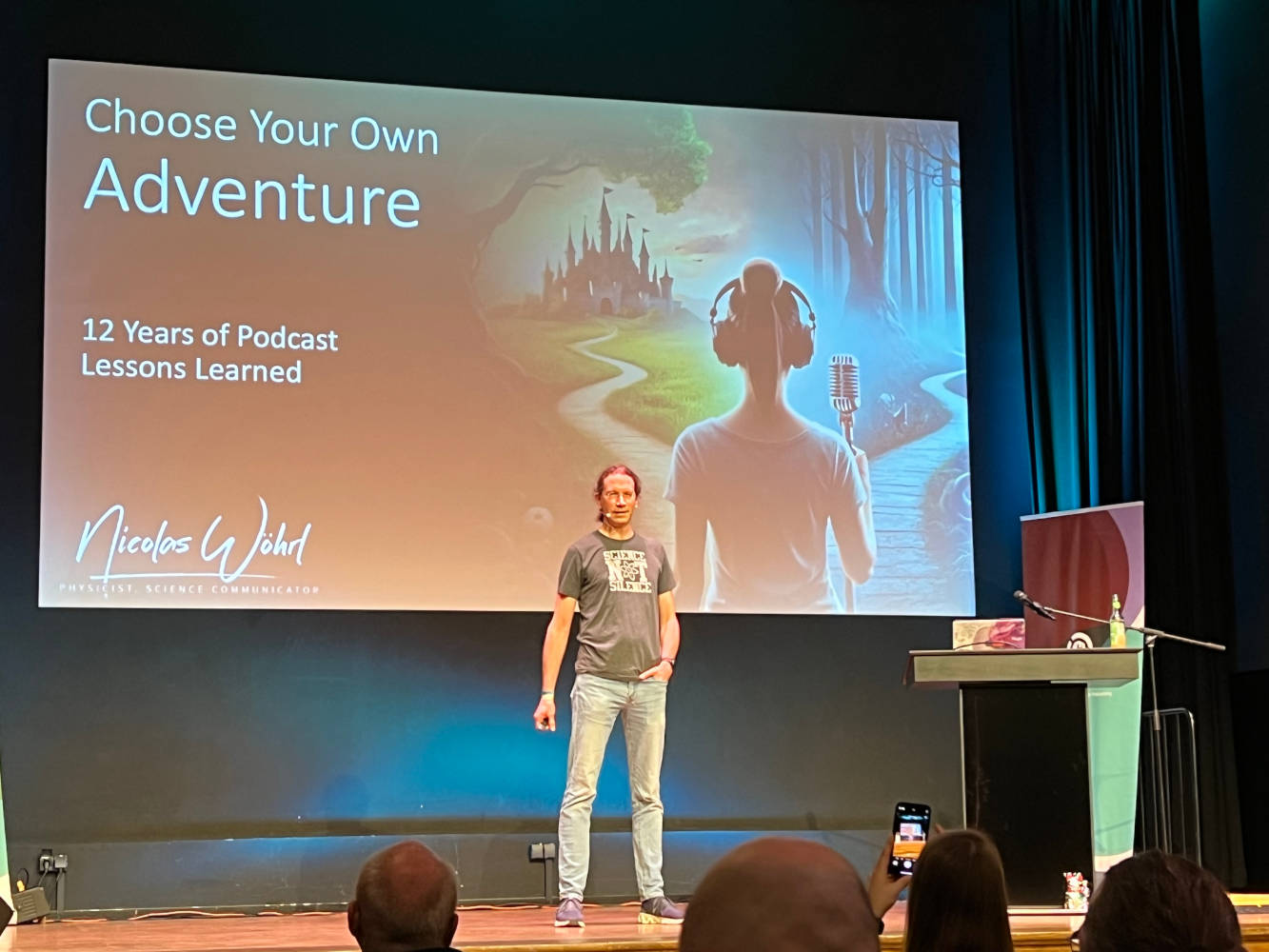
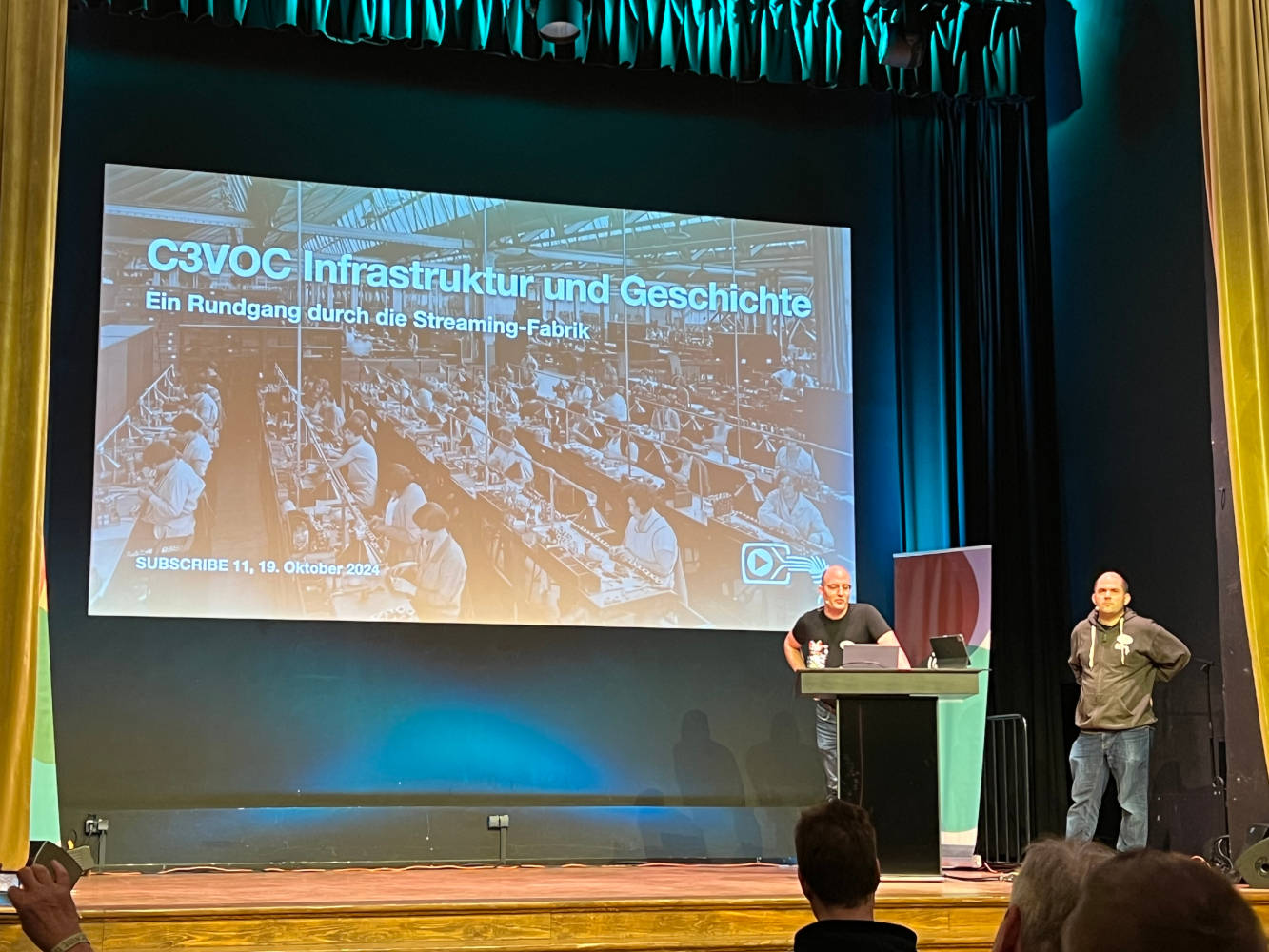
I found the presentation Zwischen den Codezeilen - die Ultraschall Keynote (📽️) by Joram Schwartzmann particularly exciting. In it, the Ultraschall version 5.1 released during the conference was presented. Ultraschall is a very popular add-on for DAW Reaper, which drastically reduces complexity and focuses on settings relevant for podcasting. The changes in the new version include:
- now officially available on Linux!
- Creation of audiograms (teaser videos for social media)
- Live muting during recording
- Chapter marker import and YouTube chapter export
- Fancier LUFS monitoring
- Outtakes functionality
- Help buttons now available in all Ultraschall dialogs
The new version is still based on Reaper 6.83 from October 2023, as many existing users may also need a new license when changing the Reaper version. While Ultraschall is open-source, Reaper must be purchased - a non-commercial license costs 60 USD.
I was very pleased about the official Linux support, as I still had to use an outdated MacBook Pro 13 due to the lack of support for podcast recordings.
No less exciting was the outlook for Ultrasonic 6. This version will be based on Reaper 7.x and will therefore have a new GUI engine (ReaGirl). This allows the user interface to be made more accessible (screen reader support) - better drag & drop and auto-layout should also be possible. A native whisper integration should automatically create transcripts and also simplify the editing of content, as lines of text can be displayed directly in the audio track. This could eliminate the need to listen while editing - even searching for specific lines of text in the recording is possible. Impressive. 🤯
The only drawback: there is still no exact date for the next main Ultraschall version.
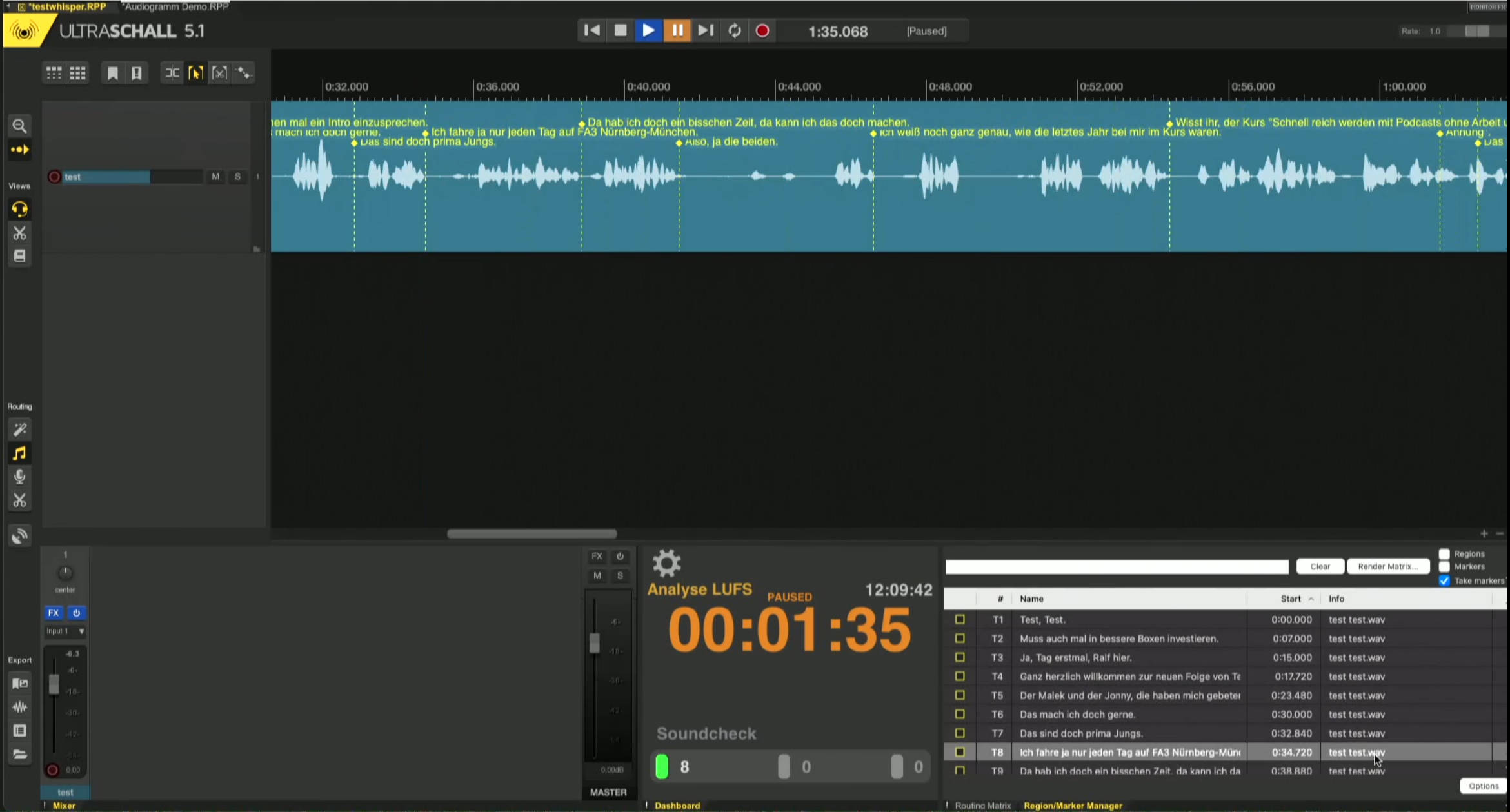
In the presentation Wie lernt eine Maschine? KI-Audio mit Auphonic (📽️), Christoph Grasser and Georg Holzmann summarized various developments in the field of audio technology since the 1970s and explained how Auphonic works. The latter was founded in 2013 and is an easy-to-use software assistant for editing audio content. The features include:
- Noise reduction
- Leveling (especially with multiple speakers)
- filtering
- Auto equalizer
- Transcripts and automatic show notes
- Automatic removal of common filler and gap words (eh, uhm, etc.)
These features are implemented with the help of massive GPU acceleration and elaborately trained data models. Many of the features can also be used free of charge - the free quota covers up to 2 hours of gameplay per month. Auphonic is used by many members of the community for their own podcast projects.
Ben Zimmer presented the advantages of the podcast host of the same name in the talk Podcast Hosting mit Podigee: Wer sind die und was machen die da? (📽️). The company was founded in 2013 and currently has 18 employees, 75% of whom work in development and customer support. Podigee hosts almost 18,000 podcasts with around 1 million episodes and offers a simple interface for maintaining feeds and formats. Exports to all common podcast directories and services make the offer interesting from beginners to corporate podcasts.
In the workshop Gesprächspodcast: Gästeanfrage und Gesprächsführung (📽️), Kathrin Fischer reported on her lessons learned in the acquisition of interview partners. Using a few examples, she showed which approach can also be used to invite more prominent guests.
Afterwards, Martins Krumsdorf demonstrated the use of the Static Site Generator Hugo to maintain a podcast in his workshop Also ich hätte es ja lieber statisch: Alternativen zu Publisher, Podigee & Co (📽️). Specifically, he showed not only how to maintain a corresponding RSS feed but also an appealing website that also contains a player as well as show notes and transcripts.
In the workshop Podcasts sichtbar machen - eine Handreichung, Sven Sedivy shared some tips on the marketing and visual design of cover images and teaser videos. A uniform and recognizable image language (icons, font, image color) is a must-have, while teaser videos or audiograms have proven themselves especially for social media marketing. In the latter case, it is advisable to insert texts permanently and not just word by word in order to increase accessibility. When designing cover images and teasers, it should be borne in mind that faces and eyes arouse more interest than objects.
In his presentation Choose Your Own Adventure: 12 Years of Lessons Learned (📽️), Nicolas Wöhrl shared his experiences from 12 years of Methoidisch inkorrekt!, which now has around 140,000 downloads per episode. He emphasized that a consistent and well thought-out script is more important than a perfected technical setup. Wöhrl also sees podcasts as a particularly engaging medium and motivated people to interact carefully with their own community. In order to commercialize a format, generating revenue via advertising and merchandise has proven successful. 0.36% of MI! listeners pay for an additional ad-free feed via Steady.
In the session Podcast-Design - Ein Gespräch über die Ausgestaltung von Podcast-Formaten (📽️), Tim Pritlove asked German podcast producer Maria Lorenz-Bokelberg about her personal story. She is best known for her company Pool Artists, which is behind numerous podcasts such as Zeit Online. It was interesting to note that the overlong episodes of the Alles gesagt? format are still recorded in Lorenz-Bokelberg's private apartment.
In the presentation C3VOC Infrastruktur und Geschichte (📽️), Andi Hubel and Daniel Molkentin gave an insight into the work of the CCC Video Operationg Center working group. This streams, edits and publishes talks at Chaos-related events afterwards. The software developed for this is completely open-source and has been continuously optimized since 2011. As a regular conference-goer, I found the numerous small details extremely interesting. The VOC does an unprecedentedly good job, which commercial conferences generally cannot keep up with. Recordings are usually online in excellent quality within a very short time and can be shared without any problems thanks to our own CDN.
At Subscribe, they were again looking for volunteers to support the team and take on camera or mixing shifts. This was my first time supporting the team and I was thrilled at how low the entry hurdle was. The software used for the recording voctomix can also be used without prior knowledge to make fade-ins - the basics of the hardware (mixer, camera, microphone) are taught in a few minutes.
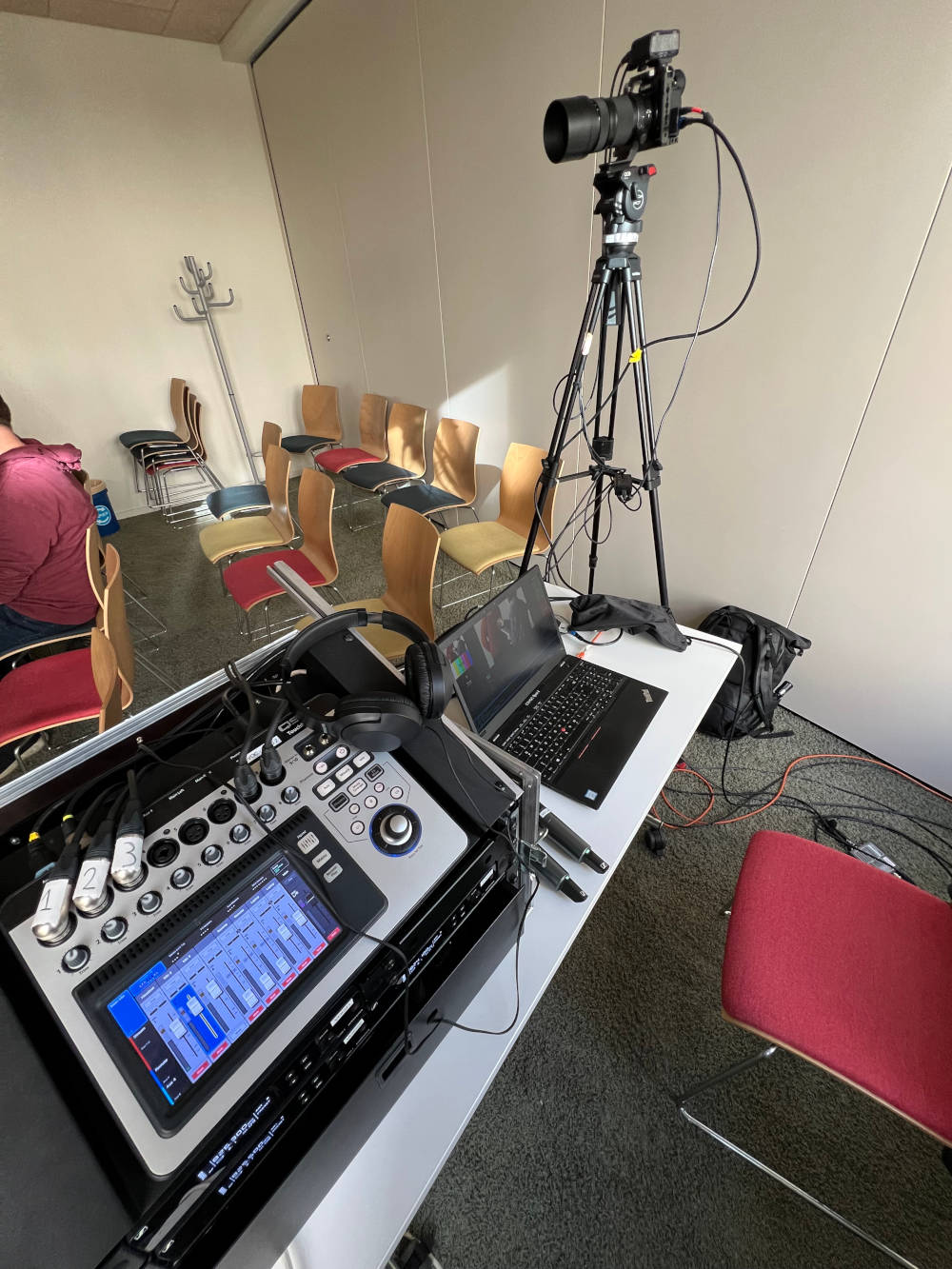
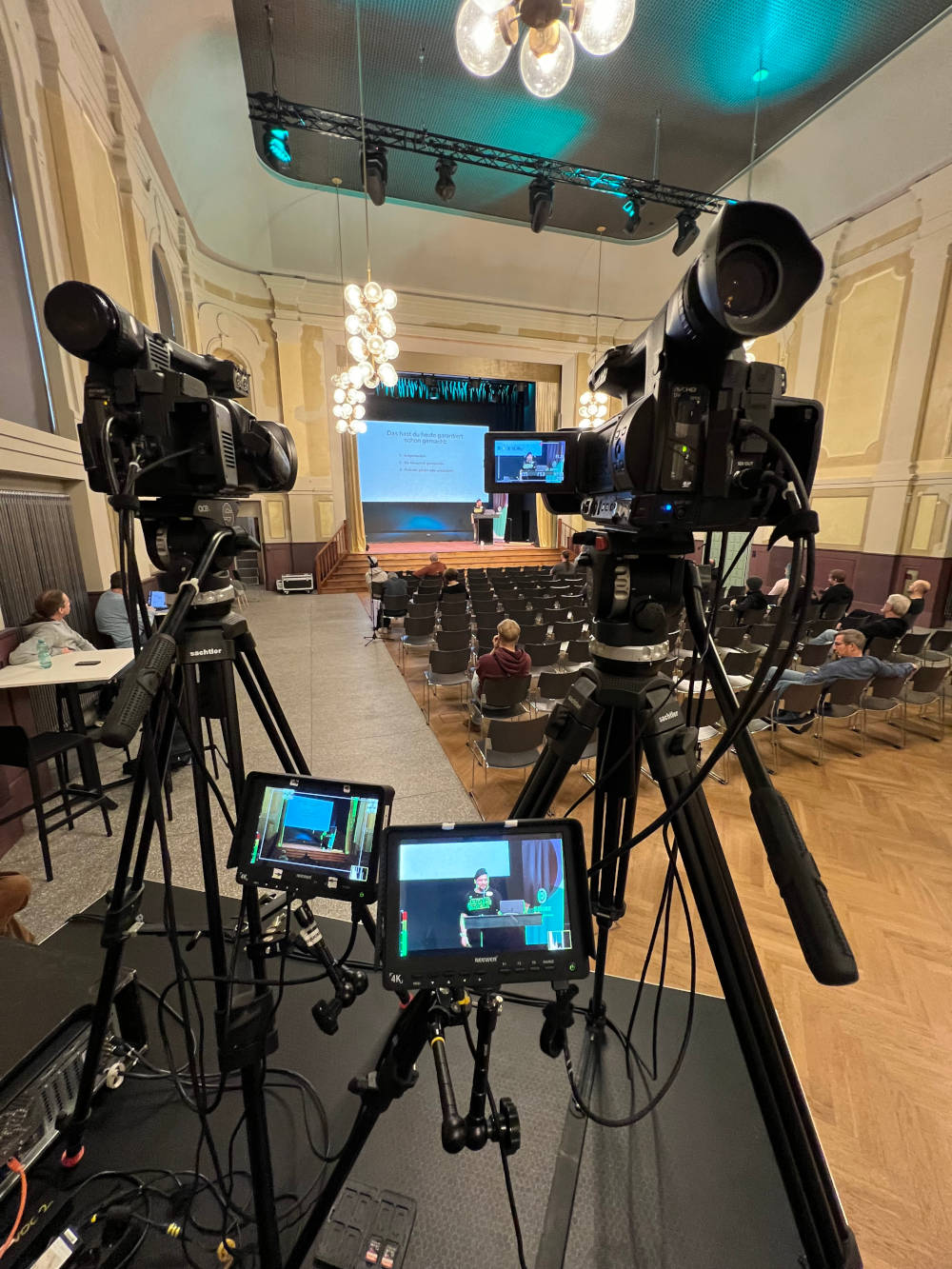
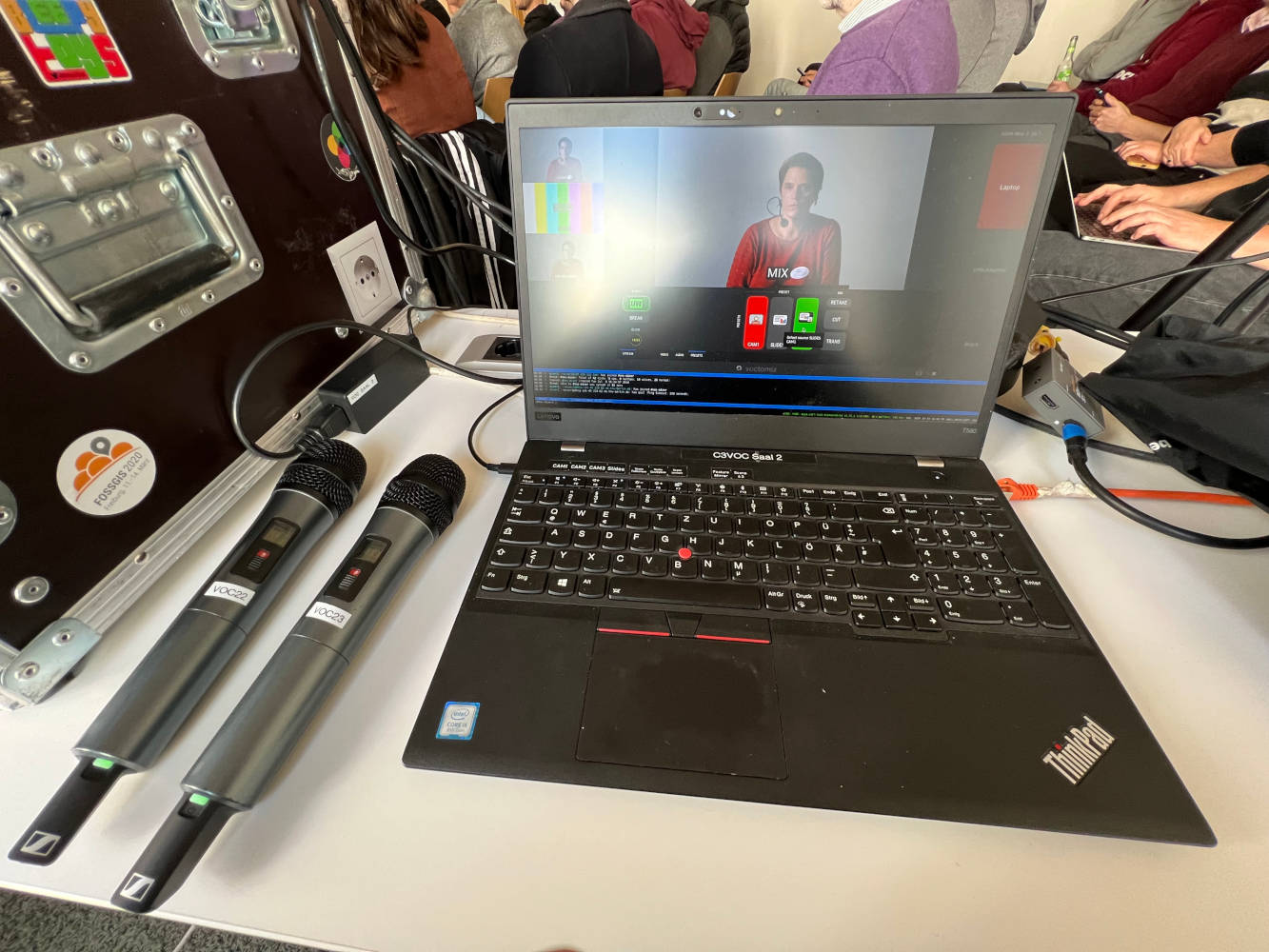
The morning of the last day revolved increasingly around the Fediverse. In their talk Die Zukunft ist dezentral: Podcasts und das Fediverse (📽️), Andi Hubel and Melanie Bartos gave an overview of the services offered in the federated universe and explained the added value of protocols such as ActivityPub. The presentation was preceded by a survey on services and applications used, which was evaluated during the presentation.
MacSnider emphasized the need for free platforms as an alternative to commercial offerings in his presentation Plattformfrei und Spaß dabei! (📽️) and compared common podcast apps in terms of the features they offer.
I was very pleased that Benjamin Bellamy, the founder of the Castopod project, was also present. In his presentation Free your Podcasts, Free your Audience - Podcast Publishing in the Fediverse with Castopod (📽️), he outlined the added value of the open-source hosting platform. It can be operated on its own server and is fully integrated into the Fediverse thanks to AcitivtyPub support. This allows listeners to subscribe to the feed directly via their usual client - direct interaction in the form of likes, boosts and comments is also possible.
The ThinkPad Museum podcast is hosted via Castopod - and has even made it into the presentation 🥰
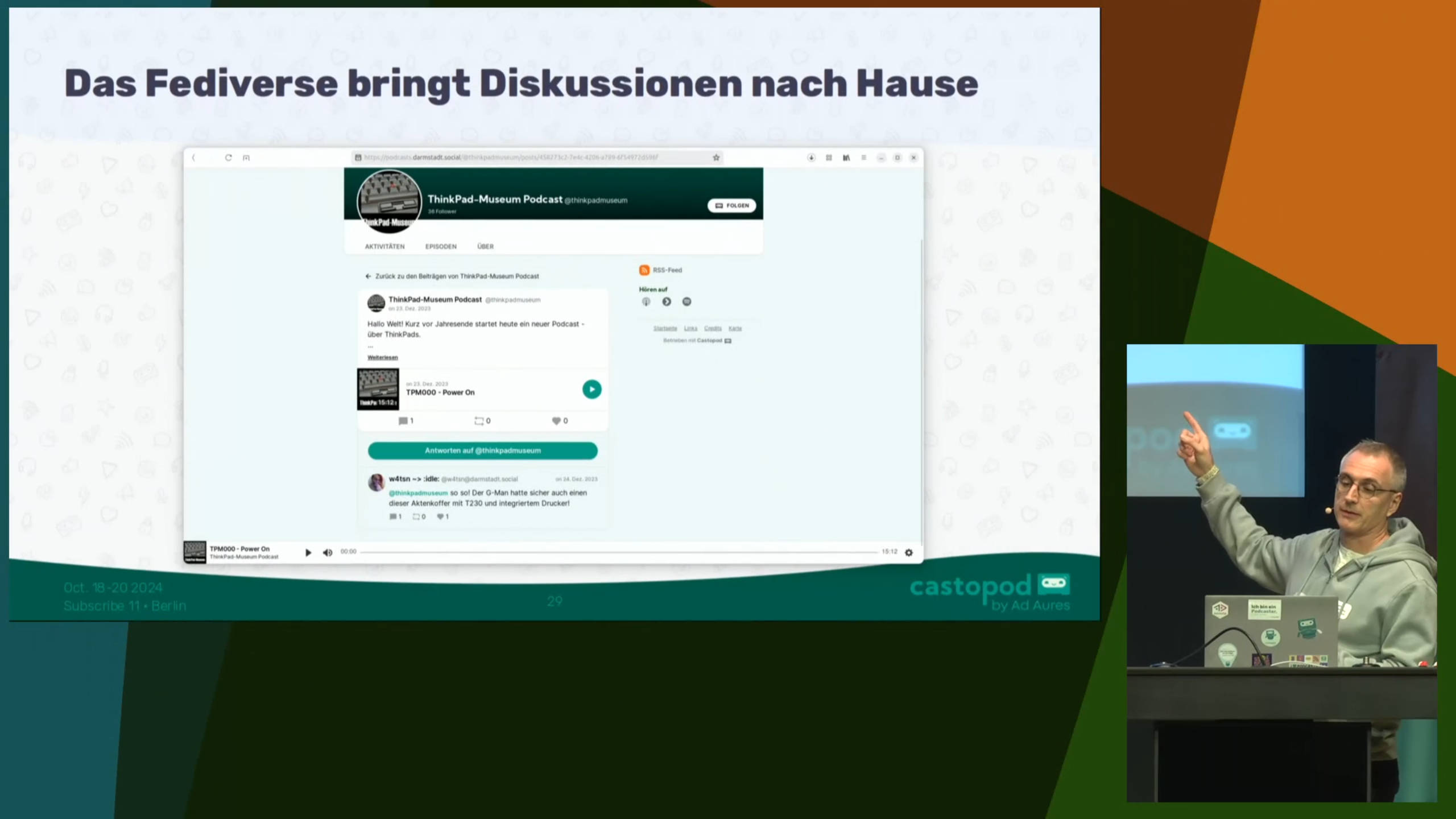
Afterwards, in his interactive workshop Hands-On with Castopod: Self-Hosting and Publishing Your Podcast on the Fediverse (📽️), Benjamin offered the opportunity to try out the installation of a Castopod instance. Within a very short time, the participants managed to set up a server and upload a first episode.
Networking
Another added value of the conference was making new contacts and being able to see the people behind the well-known voices in the flesh. For example, I spoke to Ingo Ebel from RadioTux as well as Tim Pritlove and Linus Neumann from Logbuch: Netzpolitik - it was a real pleasure!
No less interesting were the conversations with the employees of Podigee and Auphonic as well as Benjamin from Castopod and some listeners of my formats. It was great that the virtual exchange found its way into the physical world! 😊
Conclustion
I really enjoyed the conference. I didn't quite know what to expect and was very pleasantly surprised. The topics on offer were varied and exciting, and the exchange with other participants was very valuable. I took away a lot of inspiration and concrete ideas for my own projects:
- Podlove Web Player and Podcast Subscribe Button
- Try out Auphonic
- Test podcast recording under Linux with Ultraschall 5.1
- Experiment with audiograms
- Evaluate whether YouTube is worth using as another recording channel
I'm curious to see where and when the next Subscribe will take place and how the participation figures will develop. For a revival after a long break, the event was more than successful.